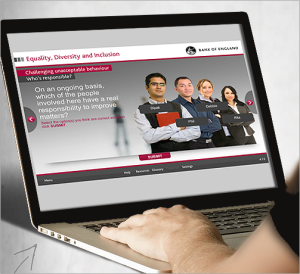Understanding Workplace Equality & Diversity
5th February 2015


There are a variety of discrimination acts that are there to make sure that companies are adhering to the minimum standards, and indeed the legislation in place is wide ranging and comprehensive. These acts include:
- Equality Act
- Human Rights Act
- Sex Discrimination Act
- Disability Discrimination Act
- Race Relations Act
All of these laws are in place to ensure that recruitment of staff is always taken from the widest possible pools of potentials, and furthermore that once at work, all staff no matter what their background are given equal treatment and equal opportunity.
Equality and Diversity – what is equality and diversity in the workplace?
So what are these terms ‘equality’ and ‘diversity’, and what do they really mean? Well, in the UK, equality’ is about promoting and fostering everybody’s right to be different, about being free from discrimination, valued as an individual, and having choice and dignity with a right to your own beliefs and values.
‘Diversity’ is a word that means ‘varied and different’. Diversity, therefore, is about more than equality. It’s about creating a culture which values individual differences and variety for the benefit of society, individuals and organisations.
What’s So Important About Having A Diverse Workplace?
Having a diverse workforce means that the organisation can offer a wide range of ideas, skills, resources and energies to the business to give it a competitive edge. There is a much wider pool of talent available to the organisations which embrace diversity, and they will reap the benefits of a broader market, improved productivity and a raised profile within the community.
Some of the key benefits of ‘diversity management’ (i.e. actively encouraging the seeking of a diverse workforce) include:
- Knowledge of different areas of the community can be utilised
- A better understanding of market segments and consumer behaviour can be attained
- You can become an employer of choice
- You will retain a wider talent pool when recruiting
- You will have a more ‘balanced’ and representative workforce
The working environment that such diversity management initiatives will produce will also be beneficial to employees. Some of these benefits include:
Staff will have a better appreciation, understanding and respect for difference:
- Contrasting perspectives will be encouraged, which can lead to improved team productivity and success
- Employees’ morale will be improved, which raises motivation
- Standards of delivery will be improved
- Retention of employees will be strengthened, as will employee progression
- All work will take place in a vibrant, inclusive and nurturing environment
Equal Opportunities

Equal opportunity means:
- All people are treated as individuals without judgements being made of them based on stereotypes.
- Understanding, appreciating and valuing all staff members’ different sets of skills and abilities, and utilising their differences for the best personal and organisational results.
- Offering fair, courteous and equal opportunities to all individuals.
- Fully embracing the principle that people will be treated with fairness.
- That a working environment is created and fostered where people of all backgrounds and experience feel valued and appreciated.
Workplace Policies
Many organisations have their own equal opportunities policy. In it should be described the steps the organisation will take to abide by equality legislation (such as those listed above) and promote equality in the workplace.
These policies are designed to prevent certain employment situations, such as:
- Male employees being paid more than female colleagues for doing the same job.
- Interviews only being given to workers/outside candidates of a particular gender or age (when these things are not a factor in being able to perform the advertised role).
- A person with a physical disability not being able to get a job in an organisation due to, for example, a lack of wheelchair access.
- New roles not being advertised internally.
- Employers allowing extra holidays for staff from one particular religion, but not from others.
- Employees being overlooked for promotion because of their gender, sexuality or disability.
Recruitment

These procedures should include:
- Setting a job description so all applicants are evaluated against the exact same criteria and nothing else.
- Advertising the post in a variety of locations (online, in the press, through job centres) in order that the role is publicised to as wide an audience as possible.
- Ensuring that there is an interview panel so that the views of more than one person are taken into consideration when deciding on who attains the position.
Promotion
Equal opportunities for promotion should always be made available to all staff, and no employee should be restricted from promotional opportunities because of their colour of skin, religion, gender or any other discriminatory reason.
It should be part of the company’s equal opportunities policy to ensure that discussions are regularly held with all members of staff, in which employees can talk about how they see their career developing, and ask for any training and support should they wish to progress into more senior roles in the company. These discussions can be undertaken on a one-to-one basis, or in front of a panel if the employee so wishes, such as at appraisals and personal reviews.
Pay
When it comes to pay, under the laws of equality, no employee should be paid any more or any less than any one of their colleagues who are performing the same role due to their age, gender, religion, sexuality or any other discriminatory reason.
However, it should here be noted that under some circumstances there becomes a legitimate reason for differences in pay between employees who are undertaking the same job role. For example if somebody has been with the company for a longer period of time, or has more experience or qualifications. It is vital, however, that the employer be able to justify that the reasons for the differences in pay are legitimate, and not based on any form of bias towards one employee over another in order to help demonstrate equal opportunities in the workplace.
What Is The Effect On Companies and Staff?

Employees can rest assured that they will not be discriminated against in the workplace, and that they have equal opportunities for promotion and progression, and that they are only being assessed on their performance and measurable merits. They will feel empowered because they know that they are only being employed for their aptitude, just as is everyone else around them.
What is more, the employee can be confident that they will be given the right tools to do their job properly, which can be anything from proper disabled access, flexible working hours, and even good communication from all members of staff. When there are no barriers to job progression, the workforce feels more positive about their jobs and will be more committed to working hard for the company that is working hard for them. These sorts of diversity and equality initiatives create a real sense of understanding and respect right throughout an organisation, which engenders a much better, more pleasant and productive working atmosphere for everyone. All organisations should promote their equality policy as widely as possible.
Employers benefit, also. Having people from all walks of life can give a huge boost to a business, with different insights, perspectives and experiences all combining to produce an effective, dynamic and creative workforce.
What To Do If You Encounter Discrimination
It is of course still the case that some companies do not adhere to the laws or even their own equal opportunities policies. If you feel that you are being discriminated against, then there are plenty of organisations that you can reach out to seek help. Consider getting in touch with:
- Your trade union
- The person in your workplace who deals with internal grievances
- Citizen’s Advice Centre
The first thing that you should do is find out about your company’s grievance procedures. It may be useful to contact the human resources department about this. If you cannot resolve the issue internally, then you can take your case to an employment tribunal, especially if you found yourself forced out of a job for what you believe to be discriminatory reasons.
Conclusion
Equality and diversity are the terms used to both define and champion the values of human rights in society, and that includes the workplace. With every individual being given an equal chance to achieve their potential, absolutely free from prejudice and discrimination, the importance of these terms, and the laws that enforce their meanings, are in place to advocate and promote the true sense of equality and opportunity for all. Understanding the principles of equality and diversity in the workplace is fundamentally important.
A good diversity programme has many beneficial effects on staff and organisations alike. Indeed, when it comes to equality and diversity, a good rubric means that the whole working environment is much better, productivity is heightened, and success and business naturally increase. A diverse workforce will reflect the external environment.
For more information on how Marshall Elearning can help you create an equal, diverse and inclusive workplace, please visit the diversity section of our website.


